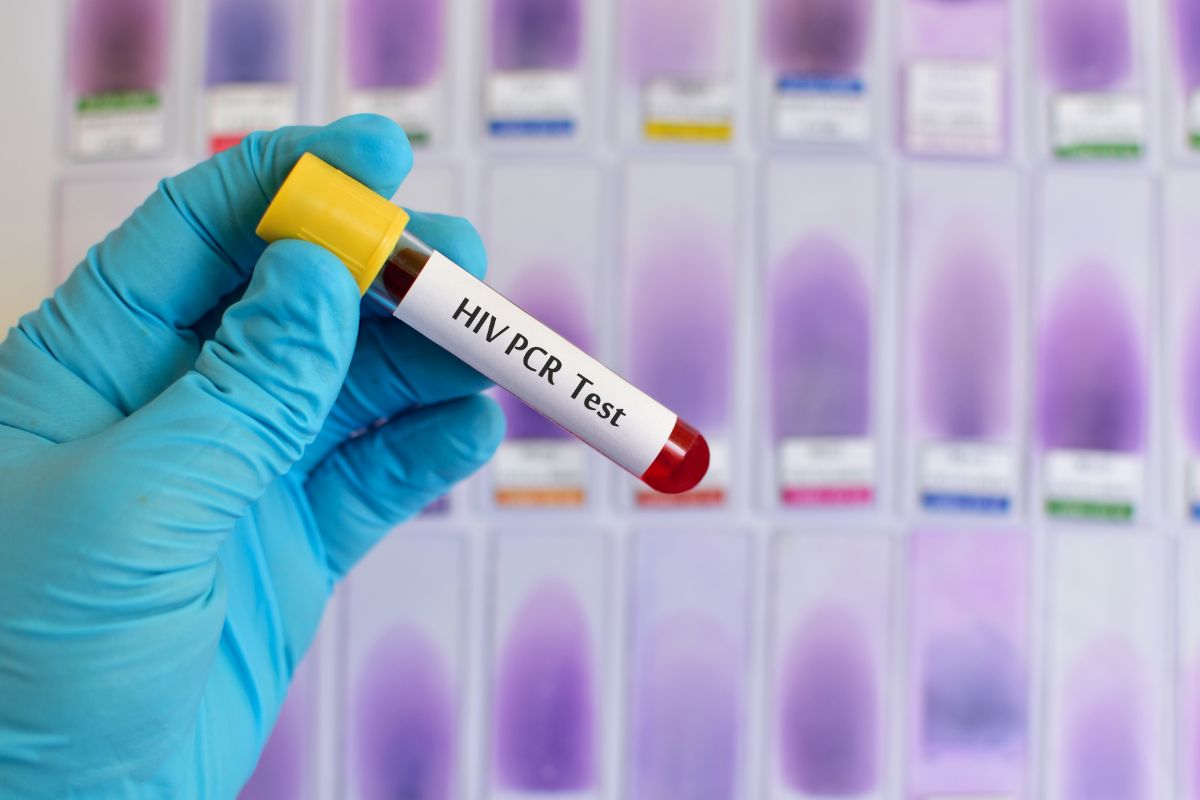HIV is a chronic and potentially serious condition that attacks the body’s immune system, increasing the risk of developing severe conditions and infections. It’s estimated that around 1.2 million people in America alone are living with HIV.

Although HIV can be potentially serious, it’s possible to lead a fulfilling life with effective treatment and not transmit the virus to your partner or sexual partners. But how long does it take to become HIV undetectable, and what constitutes an undetectable viral load?
Symptoms Of HIV
If you become infected with HIV, symptoms may take anywhere between 2 weeks to 2 months before you start showing symptoms. In the initial stages of HIV infection, symptoms can include:
- Weight loss
- Diarrhea
- Headaches
- Fever
- Rash
- Sore throat
- Painful mouth sores
- Swollen lymph glands
However, these symptoms can be indicative of common conditions, such as a flu or cold. The only way to know whether you have HIV is to get tested. If you think you’ve been at risk of contracting HIV, get tested immediately.
The Causes Of HIV Infection
The human HIV virus originally began in chimpanzees in Central Africa. It’s suspected that the chimpanzee version of HIV was passed on to humans when humans came into contact with the infected blood of chimpanzees during hunting.
HIV is transmitted through infected bodily fluids. Even if you don’t have symptoms of HIV (see also ‘What Are the Early Signs Of HIV?‘), it’s still possible to pass on the infection to others. HIV is passed on most easily during the first weeks of infection.
Most people diagnosed with HIV contract it through unprotected anal or vaginal sex. You can also contract HIV by sharing needles with an infected person. HIV (see also ‘Is HIV an Epidemic or a Pandemic?‘) can also be passed on to children during pregnancy, birth, and breastfeeding. The risks of contracting HIV (see also ‘What Is Perinatal Hiv And When Does It Occur?‘) via oral sex are incredibly low, and HIV cannot be transmitted through saliva.
If you’re having oral sex with an HIV-positive partner, your risk of contracting HIV will be much higher if they have ulcers, mouth sores, or bleeding gums. However, if you’re receiving oral sex but have recently been diagnosed with HIV, you will also be at high risk of transmitting the virus.
HIV And Undetectable Viral Load
Although there’s no cure for HIV, infected people can take antiretroviral drugs to help stop the virus from replicating in the body.
Antiretroviral drugs stop HIV from replicating and give the immune system a chance to heal itself and reduce the risk of further damage. Over time, HIV treatments can also give patients an undetectable viral load.
In most cases, someone who is HIV positive will take a combination of drugs to treat their HIV. This is because the HIV virus replicates rapidly, and without careful attention, it can become resistant. If you’ve just been diagnosed with HIV, you may take anywhere between one to four pills a day; however, the course of treatment can vary for each person.
If HIV treatment is effective, it will reduce the amount of HIV present in your bodily fluids, also called your viral load. Antiretroviral therapy stops the HIV virus replicating and suppresses (see also ‘How Does HIV Suppression Work?‘) the amount of virus present in the body. You may reach a point where the HIV in your bodily fluids is undetectable.
This doesn’t mean you’re cured of HIV, but it does mean you can no longer pass on HIV during sexual intercourse. For as long as your viral load remains undetectable, you won’t be infectious. Instead, you should keep taking your HIV treatment to prevent your viral load from increasing again.
As long as you take your HIV medication daily, you can expect your viral load to drop to undetectable within six months or less. However, with successful HIV therapy, you can remain undetectable for as long as twenty years.
HIV Viral Load: The Different Stages
When you first get infected with HIV, your viral load will be at its highest. In this phase, your body could produce as many as several million viral copies of HIV per milliliter of blood. During this stage, you’ll be at the most risk of passing on the HIV virus.
After the first few weeks, your viral load will drop. If you’re not seeking treatment, your load can still drop to as low as 50,000 copies of the virus per milliliter of blood. However, you’ll still carry a considerable risk of passing on the infection.
As soon as you start HIV treatment, your HIV viral load will start to drop significantly. Although it can take up to six months to have an undetectable viral load, it could be as short as three months. The time it takes will depend on a range of factors, including when you become infected, how high your viral load is when you start treatment, and your general health.
Most viral loads are considered undetectable when they fall below 20 to 50 copies of HIV per milliliter of blood. Research suggests that at this level, there’s no risk of passing HIV on to a sexual partner. Even if your viral load goes slightly above the 20-50 level, there’s still a minimal risk of passing on the infection to a sexual partner.
However, to be officially considered HIV undetectable, it’s recommended that you wait until you receive two undetectable results in a row, preferably over a six-month period. If you’ve only had one undetectable result, you should still protect yourself and your partner during sex to reduce the risk of transmission.
The Bottom Line
Although the unnecessary stigma around HIV is still prevalent, this virus is no longer the death sentence it used to be. Thanks to a series of developed treatments, people living with HIV can lead normal lives, and if they become undetectable, they can avoid passing on the virus.
With effective treatment, you may become undetectable within as little as three months of treatment.
- Understanding Male Reproductive Health: A Complete Guide - February 2, 2025
- Simple Healthy Skin Habits for Radiant Skin - December 6, 2024
- Unlocking the Connection Between Nutrition and Mental Health - December 3, 2024








